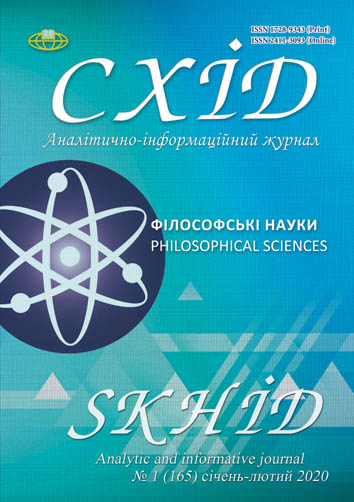Aspects of the "carnivalization" of contemporary cultural practices
DOI:
https://doi.org/10.21847/1728-9343.2020.1(165).196778Keywords:
axiology, dialogue of cultures, carnivalization, carnival behavior, carnival outlook, crisis of culture, cultural practices, cultural meaningsAbstract
The relevance of the article is due to the need to reflect on a new cultural phenomenon that presents the cultural practices of modern chronotopos. The philosophical and cultural concepts of the state of culture are analyzed and the tendencies reflecting instability (transitivity), uncertainty, ambivalence of cultural practices and carnivalization of all spheres of life are revealed. The philosophical reflection of the essence, character, signs of carnivalization made it possible to explicate the phenomenon of "carnival" through its ideological and behavioral components. In the context of the dialogue of medieval and contemporary culture, the essence of carnivalization as a phenomenon of culture is revealed. This context is considered as a special means of restoring the integrity of worldview, world outlook, world attitude. The problem of cultural practices orientation to their value-semantic (axiological) uplift is also actualized. The nature and essence of such categories as "carnival laughter", "carnival freedom", "carnival behavior", "ambivalence" are investigated, characteristic features of carnivalisation are identified and it can be considered as a way of modeling and constructing contemporary cultural reality. The fact that the modern cultural space creates conditions not only for the functioning of carnivalization within the primary function - renewal, creation of a new life-world, but also a new world-view and meaning-making. The constructive role of cultural dialogue in the process of praxeological growth of the subjects of carnivalization has been determined. It is shown that the concept of carnivalization of Mikhail Bakhtin remains relevant at the present stage of cultural development. The discovery of carnivalization as a certain signal of the crisis of culture and the way out of it gives reason to consider carnivalization as a factor of self-organization of culture, as a complex organized system.Downloads
References
Bakhtin, M. M. (1965). Tvorchestvo Fransua Rable i narodnaya kultura srednevekovya i Renessansa. Moscow: Khudozhestvennaya literatura, 541 p. (In Russian)
Bakhtin, M. M. (1979). Estetika slovesnogo tvorchestva. Moscow: Iskusstvo, 423 p. (In Russian)
Bandlamudi, L. (2015). Carnivalization of consciousness a Catalyst for Development. In: Difference, Dialogue, and Development: a Bakhtinian World. New York: Routledge, P. 63-86. DOI: https://doi.org/10.4324/9781315669335
Braun, J. (2012). Alienation and the Carnivalization of Society Preface. In: Alienation and the carnivalization of society. Routledge Studies in Social and Political Thought.
Bulavka, L. A. (2000). Bakhtin: dialektika dialoga versus metafizika postmoderna. Voprosy filosofii, 1: 119-131 (In Russian)
Eko, U. (2007). Polnyy nazad! «Goryachie voyny» i populizm v SMI [translate by Ye. Kostyukovich]. Moscow: Eksmo, 592 p. (In Russian)
Golozubov, A. V. (2009). Teologiya smekha kak fenomen zapadnoy kulturi. Kharkov: Eksklyuziv Publishing, 468 p. (In Russian)
Gritsanov, M. A. (ed.) and Mozheyko, A. A. (2001). Postmodernizm. In: Entsiklopediya. Retrieved from http://www.gumer.info/bogoslov_Buks/Philos/PostModern/_59.php (In Russian)
Gritsenko, V. P. (1999). Kultursemiotika: Opyt sistematicheskogo izlozheniya. Krasnodar: KGUKI, 372 p. (In Russian)
Khrenov, N. (2002). Kultura v epokhu sotsialnogo khaosa. Moscow: Editorial URSS, 448 p. (In Russian)
Kormer, V. F. (1991). O karnavalizatsii kak genezise «dvoynogo soznaniya». Voprosy filosofii, 1: 166-185 (In Russian)
Lotman, Y. M. (1992). Kultura i vzryv. Moscow: Gnozis, 272 p. (In Russian)
Maltseva, O. (2018). The phenomenon of the carnivalization of sport in postmodern society. Skhid, 1(153), 108-120. DOI: https://doi.org/10.21847/1728-9343.2018.1(153).127538
Mironov, V. V. (1996). Nauka i «krizis kultury» (ili zatyanuvshiysya karnaval?). Vestnik Moskovskogo universiteta. Seria Filosofiya. 4: 3-13. (In Russian)
Nazintsev, V. V. (1997). Smekhovaya sinergetika mira. Dialog. Karnaval. Khronotop. 1: 34-60 (In Russian)
Semenova, Y. A. (2013). Aktualizatsiya karnavalnykh protsessov v period krizisa kultury (na primere subkultury studenchestva). Problemy sovremennogo obrazovaniya. 5: 150-159 (In Russian).
Sharnina, M. (2016). The dialectic of neo-mythological patterns of the development of "carnival ritual" person in the works by Yuriy Andrukhovych. Skhid, 6 (146). DOI: https://doi.org/10.21847/1728-9343.2016.6(146).78856 (In Ukrainian)
Shcherbakova, N. V. (2015). Ideological support of transformations for youth value instructions as a determinant of their moral development optimization: philosophical aspect. VERSUS. 1(5): 89-94. Retrieved from http://magazine.mdpu.org.ua/index.php/versus/article/view/1253 (In Ukrainian)
Troitska, O. M. (2016). Dіalog і dіalogіchnіst v kulturno-osvіtnomu prostorі: fіlosofskі zasadi. Humanitarian Bulletin of Zaporozhye State Engineering Academy. 65: 50-57. DOI: https://doi.org/10.30839/2072-7941.2016.71166 (In Ukrainian)
Troitska, T., Troitska O., Popravko O. (2018). The value-semantic essence of the holiday and its role in the harmonization of the cultural being of the modern man. VERSUS. 1-2 (11-12): 67-72. DOI: https://doi.org/10.33842/2313-4562/2018/11/16/72 (In Ukrainian)
Zagibalova, M. A. (2011). Osobennosti kulturnogo razvitiya sovremennosti: fenomen karnavalizatsii. Izvestiya Tulskogo gosudarstvennogo universiteta. Gumanitarnye nauki. 2: 32-39. (In Russian)
Zagibalova, M. A. (2013). Karnaval i karnavalizatsiya kak pogranichnye fenomeny kultury. Izvestiya Volgogradskogo gosudarstvennogo tekhnicheskogo universiteta. Seriya: problemy sotsialno-gumanitarnogo znaniya. 13(9): 96-98. (In Russian)
Downloads
Published
How to Cite
Issue
Section
License
Copyright (c) 2020 Olena Troitska, Olga Popravko, Nina Shcherbakova

This work is licensed under a Creative Commons Attribution-NonCommercial-NoDerivatives 4.0 International License.
1. Authors bear responsibility for the accuracy of facts, quotations, numbers and names used.
2. Manuscripts are not sent back.
3. The publisher does not always agree with the authors' opinion.
4. The authors reserve the right to authorship of the work and pass the first publication right of this work to the journal under the terms of a Creative Commons Attribution-NonCommercial-NoDerivatives 4.0 International License. This license allows others to distribute (copy) the published work for non-commercial purposes, provided there is mandatory attribution to its authors and a link to the first publication in our journal.
5. The authors have the right to conclude separate supplement agreements that relate to non-exclusive work distribution in the form in which it has been published by the journal (for example, to upload the work to the online storage of the journal or publish it as part of a monograph), provided that the reference to the first publication of the work in this journal is included.

